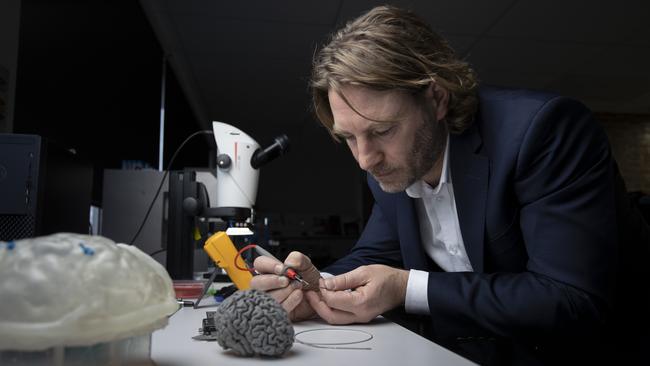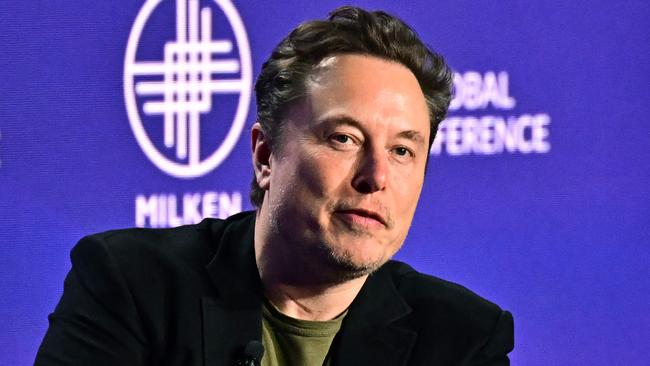Aussie tech company uploads ChatGPT to people’s brains
The biotech, backed by Bill Gates and Jeff Bezos, has taken its next giant leap, incorporating ChatGPT into human brains to help those with paralysis communicate with others more freely.
Business
Don't miss out on the headlines from Business. Followed categories will be added to My News.
Synchron – the Australian biotech backed by Bill Gates and Jeff Bezos – has taken its next giant leap, incorporating ChatGPT into human brains to help those with paralysis communicate with others more freely.
The rival to Elon Musk’s Neuralink has partnered with OpenAI to unveil artificial intelligence-driven emotion and language predictions for patients, replacing the need for an eyetracker or voice control.
Crucially, it allows those with severe paralysis and inability to speak to communicate with others closer to real time and in a more natural way – an advancement which can potentially help millions reclaim their “fundamental human right: freedom of expression”.
Chief executive Tom Oxley – an Australian-born neurologist who also works at Mount Sinai hospital in New York – said the first generation of its brain computer interface involved people ‘making their way slowly around a keyboard to hit letters’.
But under the partnership with OpenAI – which Dr Oxley stresses that Synchron doesn’t share user brain data with – the company’s BCI can generate automated prompts for texting and chatting, incorporating a user’s emotions and more accurately predicting their intention.
“The AI is able to make environmentally relevant, contextual predictions on what next choice you want to make,” Dr Oxley said.
“So, you can imagine a world where the AI is taking inputs from listening to people talking to you, it knows what the weather is like outside, it knows what your calendar is like, and when someone asks you a question, or you get a text message, it’s able to generate prediction on what your next choice is.

Synchron has launched the ChatGPT feature in one patient, Mark from Pittsburg who has amyotrophic lateral sclerosis. He said use of AI made it easier to engage in conversations, allowing him to communicate faster, while requiring less energy from him.
“As someone who will likely lose the ability to communicate as my disease progresses, this technology gives me hope that in the future I’ll still have a way to easily connect with loved ones. This will be a game changer,” Mark said.
Dr Oxley said Mark and other potential users choose to accept the AI-powered prompts or not, with the technology working in a similar way to predictive text on your mobile phone or computer.
“Prompts are still going to be making errors, they may hallucinate. They’re still not going to be perfect, but they are trying to predict what your intent is, and then the BCI (brain computer interface) has to remain the guardian of your free will, of your choice,” Dr Oxley said.
“You can see where it’s going. The way I think about it is it becomes an extension of your brain, basically, eyes and ears, you know, doing complicated analysis of your environment and then presenting. It reminds me of how the brain works.”
Synchron’s BCI is implanted into the blood vessel on the surface of the motor cortex of the brain via the jugular vein via a “minimally invasive” procedure, unlike Neuralink. Dr Oxley compared it to installing a stent versus open-heart surgery.
“There are about six companies now competing in this space, and we’re the only company that doesn’t need open brain surgery. It’s quite different technology.”
Synchron was also the world’s first company to be granted approval from the US Food and Drug Administration to begin clinical trials on a permanent computer-brain implant, beating Mr Musk’s Neuralink to that milestone. It BCI has now been implanted in 10 patients as it seeks full FDA approval. This compares to Neuralink so far fitting its technology in one patient.
“We’ve been at this for a little while longer (than Neuralink). The FDA want to know that it’s safe over a period of years, and we’ve got data going back to 2019.”
But Dr Oxley welcomed competition from Mr Musk, saying there were about eight million people in the US affected by paralysis alone. “It’s great that Elon is focused on this problem. It’s hard to see where the ceiling with this technology goes.”

Synchron has so far raised about $US140m from investors, and Dr Oxley said the company may seek another injection.
“We’ve still got a fair bit in the bank, so we’ve still got enough to get through a couple of critical milestones but probably not enough to get all the way through the pivotal trial, so we’ll see how we go. For the moment, we’re doing pretty well.”
He also has good relationships with Synchron’s current investor base, particularly Mr Bezos, who he said was focused on the “inevitable nature of the technology resulting in superior degrees of technology control”.
Synchron is also building a mobile app for Apple’s iOS, saying its partnership with OpenAI is not exclusive.
“We really like ChatGPT-4o, but it’s such a fast moving space we’re in that we’re remaining agnostic to what APIs we’re going to use, and keep considering what’s in the best interest (of patients) and building a back end that can swap whatever APIs are working best.
“BCIs preserve and extend a fundamental human right: the freedom of expression,” Dr Oxley said. “We take our autonomy for granted, until it is gone. This is a pivotal moment at the convergence of powerful technologies that can restore lives.”
Originally published as Aussie tech company uploads ChatGPT to people’s brains



